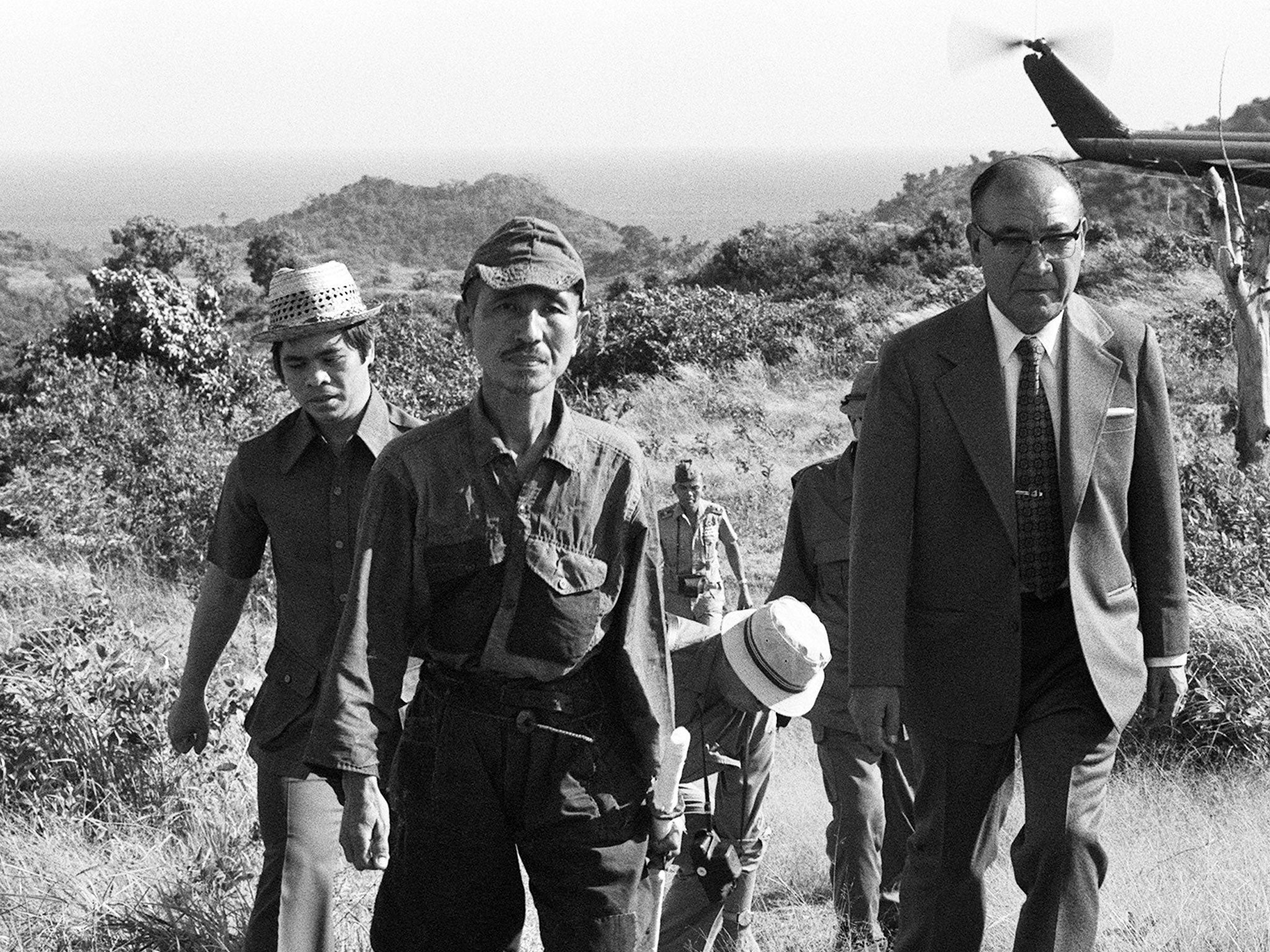Hiroo Onoda, the last Japanese soldier to give himself in: “When I surrendered, the past seemed like a dream”
Second Lt. Onoda, who finally surrendered in 1974, has died at the age of 91

Your support helps us to tell the story
From reproductive rights to climate change to Big Tech, The Independent is on the ground when the story is developing. Whether it's investigating the financials of Elon Musk's pro-Trump PAC or producing our latest documentary, 'The A Word', which shines a light on the American women fighting for reproductive rights, we know how important it is to parse out the facts from the messaging.
At such a critical moment in US history, we need reporters on the ground. Your donation allows us to keep sending journalists to speak to both sides of the story.
The Independent is trusted by Americans across the entire political spectrum. And unlike many other quality news outlets, we choose not to lock Americans out of our reporting and analysis with paywalls. We believe quality journalism should be available to everyone, paid for by those who can afford it.
Your support makes all the difference.When Japanese soldier Hiroo Onoda stumbled out of the Philippine jungle in 1974, the world had been transformed beyond his imagination. The American enemy he fought against had become a military ally of the country he fought for. Japan had been transformed from pariah militarist state to peaceful superpower. One of the few things than remained unchanged was Onoda himself.
Even after learning that he had battled on for three decades against an invisible enemy long after World War II ended in 1945, hunted by Philippine police and a succession of Japanese search parties, he remained unrepentant. “Every minute of every day, for 30 years, I served my country,” he said afterwards. “I have never even wondered if that was good or bad for me as an individual.”
Onada, whose death from heart failure at a Tokyo hospital at the age of 91 was announced yesterday, was treated as a hero when he was finally found. Yesterday, Japan’s top government spokesman, Yoshihide Suga, praised Onoda’s strong will to live, telling reporters: “I vividly remember that I was reassured of the end of the war when Mr Onoda returned to Japan.”
Trained to survive behind enemy lines, and to never surrender, Second Lt. Onoda killed perhaps 30 innocent people and wounded up to 100 during his time on the Philippine island of Lubang. Holed up in the jungle and surviving on bananas and coconuts, he became notorious among locals, resisting every attempt to lure him out. Letters and even family photographs were dropped from planes; relatives and friends flown from Japan to plead over loudspeakers. All were ignored.
It took a young Japanese backpacker, on a quixotic mission to find the missing soldier, to succeed where everyone had failed. The emaciated Onoda, still carrying his samurai sword and wearing a tattered uniform, said he wouldn’t surrender unless he heard the official orders, so his ageing former commanding officer was flown to the Philippines. When a disbelieving Onoda was told to cease fighting, “everything went black.”
“I felt like a fool,” he later wrote. “What had I been doing all these years?”
Onoda arrived back in Japan to a hero’s welcome, feted for his resourcefulness and selfless dedication to a cause the country had long abandoned. His military bearing and dignity triggered nostalgia and even sadness among many Japanese for the values they had lost in the rush to postwar prosperity. But Onoda was quickly disappointed by what he saw.
Japan had been neutered in defeat, its military defanged by the US-penned constitution, its people left with “no confidence in their culture or themselves".
The emperor, in whose name he had fought what he thought was a sacred war, had been stripped of his god-like status and reduced to a mere symbol of the state.
Onoda found common cause with ultra-conservatives who denied Japan was an aggressor and said it had no choice but to attack the rest of Asia. He bitterly blamed “left-wing propaganda” for promoting war guilt in Japanese schools.
“I don’t blame the United States for this,” he wrote. “They wanted a weak Japan, and their mission is accomplished.”
Onoda wrote a best-selling book, “No Surrender: My Thirty Year War,” bought a car with the proceeds and travelled around Japan before leaving behind its prosperity and materialism in 1975 and moving to Brazil to become a farmer. He returned with his new wife in the 1980s to set up a survival-skills youth camp. He continued to be feted in Japan, though largely by the conservatives and revisionists who adopted him.
Once asked why he had survived when so many Japanese soldiers had been killed or starved across Asia, he said it was because he was competitive, young and healthy and had nothing to do but focus on this orders.
“I was determined to fulfill my mission,” he said. “When I surrendered, the past seemed like a dream.”
Join our commenting forum
Join thought-provoking conversations, follow other Independent readers and see their replies
Comments